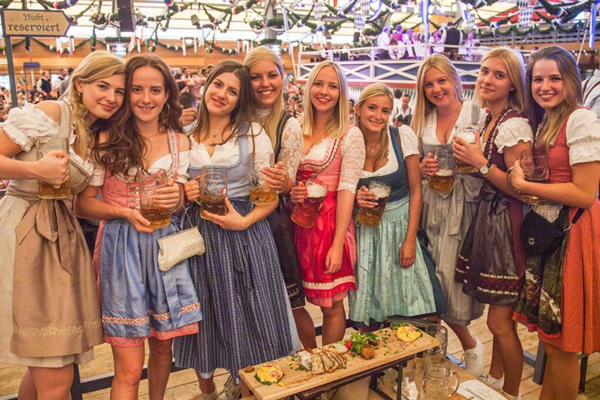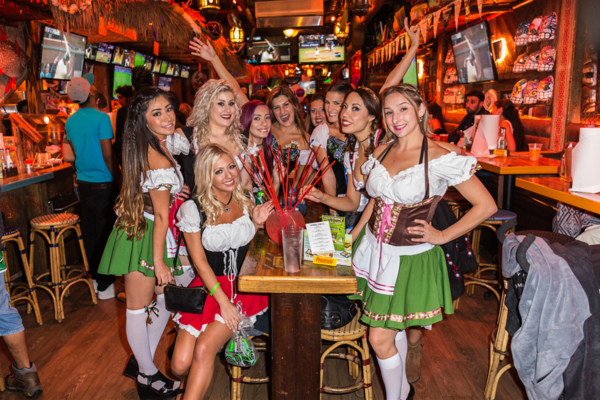Oktoberfest (German Pronunciation: [ƆkˈToːBɐˌFɛst]) Is The Worlds Largest Volksfest (Beer Festival And Travelling Funfair). Held Annually In Munich, Bavaria, Germany, It Is a 16- To 18-Day Folk Festival Running From Mid- Or Late September To The First Sunday In October, With More Than Six Million People From Around The World Attending The Event Every Year. Locally, It Is Called d’Wiesn, After The Colloquial Name For The Fairgrounds, Theresienwiese. The Oktoberfest Is An Important Part Of Bavarian Culture, Having Been Held Since The Year 1810. Other Cities Across The World Also Hold Oktoberfest Outfit That Are Modeled After The Original Munich Event.
During The Event, Large Quantities Of Oktoberfest Beer Are Consumed: During The 16-Day Festival In 2013, For Example, 7.7 Million Litres (66,000 Us Bbl; 1,700,000 Imp Gal) Were Served. Visitors Also Enjoy Numerous Attractions, Such As Amusement Rides, Sidestalls, And Games. There Is Also a Wide Variety Of Traditional Foods Available.

The Munich Oktoberfest Originally Took Place In The 16-Day Period Leading Up To The First Sunday In October. In 1994, This Longstanding Schedule Was Modified In Response To German Reunification. As Such, If The First Sunday In October Falls On The 1st Or The 2nd, Then The Festival Would Run Until 3 October (German Unity Day). Thus, The Festival Now Runs For 17 Days When The First Sunday Is 2 October And 18 Days When It Is 1 October. In 2010, The Festival Lasted Until The First Monday In October (4 October), To Mark The Events Bicentennial.
Kronprinz Ludwig (1786–1868), Later King Ludwig I (Reign: 1825–1848), Married Princess Therese Of Saxe-Hildburghausen On 12 October 1810. The Citizens Of Munich Were Invited To Attend The Festivities Held On The Fields In Front Of The City Gates To Celebrate The Royal Event. The Fields Were Named Theresienwiese ("Theresas Meadow") In Honour Of The Crown Princess, And Have Kept That Name Ever Since, Although The Locals Have Since Abbreviated The Name Simply To The "Wiesn". Horse Races, In The Tradition Of The 15th-Century Scharlachrennen (Scarlet Race At Karlstor), Were Held On 18 October To Honor The Newlyweds. It Is Widely Understood That Andreas Michael DallArmi, a Major In The National Guard, Proposed The Idea. However, The Origins Of The Horse Races, And Oktoberfest Itself, May Have Stemmed From Proposals Offered By Franz Baumgartner, a Coachman And Sergeant In The National Guard. The Precise Origins Of The Festival And Horse Races Remain a Matter Of Controversy, However, The Decision To Repeat The Horse Races, Spectacle, And Celebrations In 1811 Launched What Is Now The Annual Oktoberfest Tradition.

The Fairground, Once Outside The City, Was Chosen Due To Its Natural Suitability. The Sendlinger Hill (Today Theresienhohe) Was Used As a Grandstand For 40,000 Race Spectators. The Festival Grounds Remained Undeveloped Except For The Kings Tent. The Tastings Of "Traiteurs" And Other Wine And Beer Took Place Above The Visitors In The Stands On The Hill. Before The Race Started, a Performance Was Held In Homage Of The Bridegroom And Of The Royal Family In The Form Of a Train Of 16 Pairs Of Children Dressed In Wittelsbach Costumes, And Costumes From The Then Nine Bavarian Townships And Other Regions Dirndl Dress. This Was Followed By The Punishing Race With 30 Horses On An 11,200-Foot (3,400 Meters) Long Racetrack, And Concluded With The Singing Of a Student Choir. The First Horse To Cross The Finish Line Belonged To Franz Baumgartner (One Of The Purported Festival Initiators). Horse Racing Champion And Minister Of State Maximilian Von Montgelas Presented Baumgartner With His Gold Medal.
限會員,要發表迴響,請先登入


